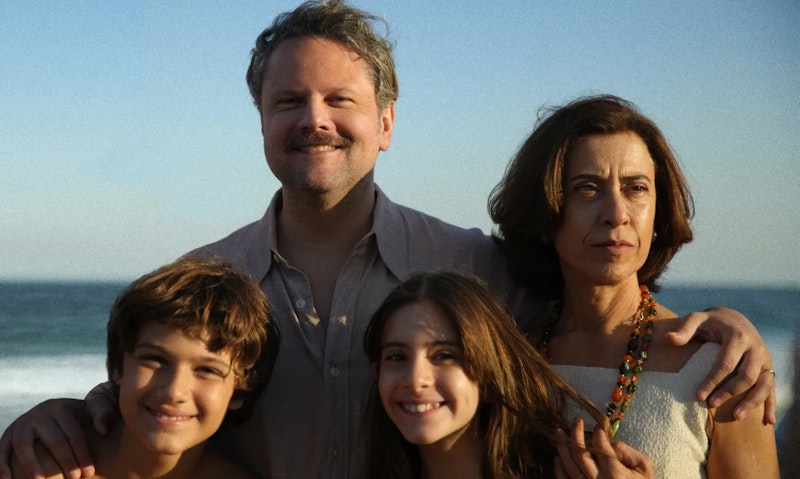It would’ve been a shame if the last film directed by Walter Salles was the 2012 adaptation of Jack Kerouac’s On the Road, which was easily the worst and least personal project of his entire career. Salles is renowned as one of the true “humanist” filmmakers in the world right now, as his empathy for the people and culture of Brazil has signified his status as one of the nation’s most prominent artistic exports. There’s no issue in the concept of an international filmmaker’s adaptation of an American classic, but On the Road was a compromised film that didn’t do Kerouac or Salles any favors. The film’s failure cast a gloomy shadow on the next step of Salles’ career; considering this is an era in which titans of the industry like Mike Leigh and Ken Loach have struggled to find funding, it wouldn’t be a surprise if Salles faced similar financial hurdles.
Salles’ absence in film culture for over a decade has been felt, but his return has proven to be the most ambitious undertaking within his entire filmography. I’m Still Here is an adaptation of the acclaimed memoir of Marcelo Rubens Paiva, whose father served as a Congressman at the Brazilian Chamber of Deputies, and was eventually tortured and murdered for speaking out against the military dictatorship. I’m Still Here is centered on Pavia’s disappearance, but the gateway to the story is his wife, Eunice, played in a masterful performance by Fernanda Torres.
I’m Still Here is a family affair in more ways than one. Salles broke out in 1994 with his road trip drama Central Station, which earned Fernanda Montenegro an Academy Award nomination for Best Actress, the first for a Brazilian. It’s fitting that three decades later, Montenegro’s daughter, Torres, is at the center of a new Salles film, which earned her an Oscar nomination of her own. Montenegro also appears in the film as an older version of Eunice, as a heartwarming “Easter Egg” for those that have followed Salles’ filmography for years. Similar to American auteurs like David Lynch or Wes Anderson, his reliance on a familiar troupe of actors have made each of his films feel like a family reunion.
I’m Still Here isn’t the first instance in which Salles drew from Brazil’s political history, as he crafted a clever coming-of-age story about a young Che Guevara with The Motorcycle Diaries back in 2004. The brilliance of The Motorcycle Diaries is that it was an origin story for radicalism, and showed how an industrious young man built the foundations of his political thesis. I’m Still Here is similarly dynamic in its examination of familial legacy; although it's a fairly instructive analysis of the Fifth Brazilian Republic, Salles has filtered his depiction of history by how it related to just one family.
A fatal flaw that many historical epics face is an indulgence in tragedy. Although it would be antithetical for a film with such noble ambitions to in any way diminish the brutality of its subject, it’s equally disrespectful to depict historical figures as merely objects, and not people who experienced hardships firsthand. It’s evident from every frame of I’m Still Here that Salles had tremendous admiration for his national heritage, as the film’s only indulgence is its exploration of the diverse, passionate, and caring people of Brazil. I’m Still Here is narrowly focused on the Pavia family, but it's the story of how an entire culture remained strong-willed in the face of fascism. There are moments of abrupt violence that serve as wake-up calls, as nothing about I’m Still Here feels saccharine.
At 136 minutes, I’m Still Here has the scope of an epic, but the intimacy of an independent darling, as a majority of this film is composed of scenes of domestic survivalism. A buoyant first act dedicated to the inception of the revolutionary movement is undercut by the abrupt disappearance of Rubens Paiva, which is a disruption to his household dynamics. More crushing than the lack of a paternal figure are the questions that his absence has raised; there was never a formal declaration in which the government denounced Paiva, nor was there evidence of his remains that were found washed up on a deserted shore. The lack of tangible evidence instills a cruel sense of hope within Paiva’s family, as they’re left to cling on to a childish hope that there is a miracle yet to be unearthed.
The brilliance of Torres’ performance is the depiction of the dual roles that Eunice is forced to perform. She was already an activist prior to her husband’s departure, and has grown even more focused on the development of a resistance movement against the military. At the same time, she’s saddled with the responsibility of two parents, and must guide her five children during a sensitive period of adolescence in which they already would’ve been agitated, even without the death of their father. The compounded pressure placed upon Eunice has denied her the opportunity to grieve; any personal time taken to mourn would be wasteful considering her obligations as a guardian, lawyer, and citizen of Brazil.
I’m Still Here is framed like an investigative thriller told over several decades, and the emotional breakdowns that are peppered throughout aren’t melodramatic. While this still results in a film that’s grueling at times, I’m Still Here has been positioned as a crowd-pleaser in its native country, and is the highest grossing Brazilian film since the pandemic. If it was able to beat the god-awful Emilia Perez for the Academy Award for Best International Feature, it would be a win for both Brazilians and cinephiles.

